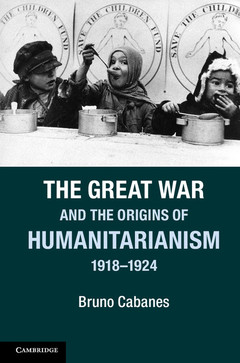Description
The Great War and the Origins of Humanitarianism, 1918–1924
Studies in the Social and Cultural History of Modern Warfare Series
Author: Cabanes Bruno
Pioneering study of the transition from war to peace and the birth of humanitarian rights after the Great War.
Language: English
Subject for The Great War and the Origins of Humanitarianism...:
Approximative price 38.06 €
In Print (Delivery period: 14 days).
Add to cart
The Great War and the Origins of Humanitarianism, 1918-1924
Publication date: 03-2014
Support: Print on demand
Publication date: 03-2014
Support: Print on demand
Approximative price 87.13 €
In Print (Delivery period: 14 days).
Add to cart
The Great War and the Origins of Humanitarianism, 1918-1924
Publication date: 03-2014
400 p. · 15.2x22.9 cm · Hardback
Publication date: 03-2014
400 p. · 15.2x22.9 cm · Hardback
Description
/li>Contents
/li>Biography
/li>
The aftermath of the Great War brought the most troubled peacetime the world had ever seen. Survivors of the war were not only the soldiers who fought, the wounded in mind and body. They were also the stateless, the children who suffered war's consequences, and later the victims of the great Russian famine of 1921 to 1923. Before the phrases 'universal human rights' and 'non-governmental organization' even existed, five remarkable men and women - René Cassin and Albert Thomas from France, Fridtjof Nansen from Norway, Herbert Hoover from the US and Eglantyne Jebb from Britain - understood that a new type of transnational organization was needed to face problems that respected no national boundaries or rivalries. Bruno Cabanes, a pioneer in the study of the aftermath of war, shows, through his vivid and revelatory history of individuals, organizations, and nations in crisis, how and when the right to human dignity first became inalienable.
Introduction: human disasters: humanitarian rights and the transnational turn in the wake of the First World War; 1. 'Rights, not charity': René Cassin and war victims; 2. Justice and peace: Albert Thomas, the ILO and the dream of a transnational politics of social rights; 3. The tragedy of being stateless: Fridtjof Nansen and the rights of refugees; 4. The hungry and the sick: Herbert Hoover, the Russian famine, and the professionalization of humanitarian aid; 5. Humanitarianism old and new: Eglantyne Jebb and children's rights; Conclusion: human dignity: from humanitarian rights to human rights; Bibliographical essay; Bibliography.
Bruno Cabanes is an Associate Professor in the Department of History at Yale University. His research focuses on the period of transition that followed World War I and, in particular, the demobilization of combat troops, the traumatic impact of war on soldiers and civilians, and, more recently, the environmental history of war and its aftermath. His publications include La victoire endeuillée: La sortie de guerre des soldats français (1918–1920) (2004), which was awarded the Gustave Chaix d'Est Ange Prize, 2004, by the Académie des Sciences Morales et Politiques, Paris and shortlisted for the Augustin-Thierry Prize for the Best Book of the Year in 2004. A member of the Comités Scientifiques (Advisory Boards) of the Historial de la Grande Guerre, Péronne and the Museum of the Great War, Verdun, France, he also serves on the editorial board of Vingtième siècle. Revue d'histoire.
© 2024 LAVOISIER S.A.S.




